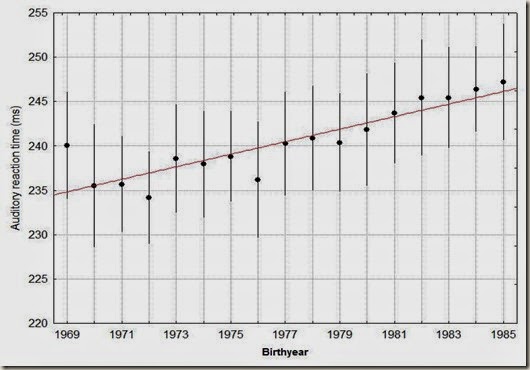Increasing simple reaction times demonstrate decreasing genetic intelligence in Scotland and Sweden
There is a paradox in that although more intelligent people tend to have fewer children than less intelligent people, more recent generations tend to perform better on tests of psychometric intelligence. Since intelligence is highly heritable, this differential fertility would predict a decrease in IQ in the general population. The apparent IQ increase, known as the Flynn effect, is assumed to have environmental causes, such as schooling and the focus on abstract categorization prevalent in an information society. In other words, two different processes are simultaneously working in opposite directions, and it is then impossible to separate them when measured with the same instruments, typically paper-and-pencil matrix reasoning tests. Here, we show that change in genetic intelligence can be estimated, independently of the Flynn effect, by way of simple reaction time (RT). Data from three studies with different samples from Sweden, UK, and USA converge at an RT increase of 0.7-0.9 ms per year, which corresponds to a decrease in intelligence of between 4 and 5 IQ points per generation, or 1.3-1.7 points per decade in these countries.
This will have implications for educational attainment


The US and Canada, unlike all other countries, determine college admission by short term, idiosyncratic, subjective, internal assessment. These are called "grades".
ReplyDeleteSo far as elite education mediates elite status, why are the US and Canada so rich? Shouldn't they be much poorer, as the British, European, Antipodean, and E. Asian elite are selected for IQ (in all but name), and are, if fact, much smarter than the American and Canadian elite?
America and Canada select for traits despised in Britain. They are selected for pushiness, striving, unreflectiveness, and obedience.
Many measures of intelligence (g) are explicit measures. What about assessing for g using implicit-based measures?
ReplyDelete"Data from three studies with different samples from Sweden, UK, and USA converge at an RT increase of 0.7-0.9 ms per year, which corresponds to a decrease in intelligence of between 4 and 5 IQ points per generation, or 1.3-1.7 points per decade in these countries."
ReplyDeleteThey better look again at their samples, because such a rapid decrease is not possible:
The breeder’s equation | West Hunter
Yes, based on my analysis of SAT data, it looks like there is very roughly a decrease in intelligence of half that size per generation.
Delete"three studies with different samples from Sweden, UK, and USA"
ReplyDeleteIf we cannot see the paper yet, can we at least know the origin of these samples, exactly? Though it's all but inevitable that the selection pressures must result in a move in this direction, as Jayman says, such a rapid decline is simply far too large to be plausible. I suspect that this might be a situation slightly similar to that of the Woodley et al paper based on Galton's data, where resolution may come from a critical analysis of the sampling methodology.
So far as elite education mediates elite status, why are the US and Canada so rich? Shouldn't they be much poorer, as the British, European, Antipodean, and E. Asian elite are selected for IQ (in all but name), and are, if fact, much smarter than the American and Canadian elite?
ReplyDeleteActually, IQ tests (SAT, ACT, LSAT, etc.) are used in US admissions decisions, but I'm not sure if any Continental European country uses anything of the sort. European universities generally use high school grades and scores from examinations assessing the student's command of the high school curriculum. Some countries have open admissions for everybody with some minimum qualifications. Many European countries don't even have selective elite universities.
"They better look again at their samples, because such a rapid decrease is not possible:"
ReplyDelete"such a rapid decline is simply far too large to be plausible"
What would be the result of a dramatic drop in the consumption of iodine due to a dramatic decrease in the consumption of dairy products (and salt in the countries that add iodine to salt)?
Just to be clear - i'm not saying iodine fully explains the drop but if it is **part** of the drop then it might refute the "too fast" argument.
ReplyDelete